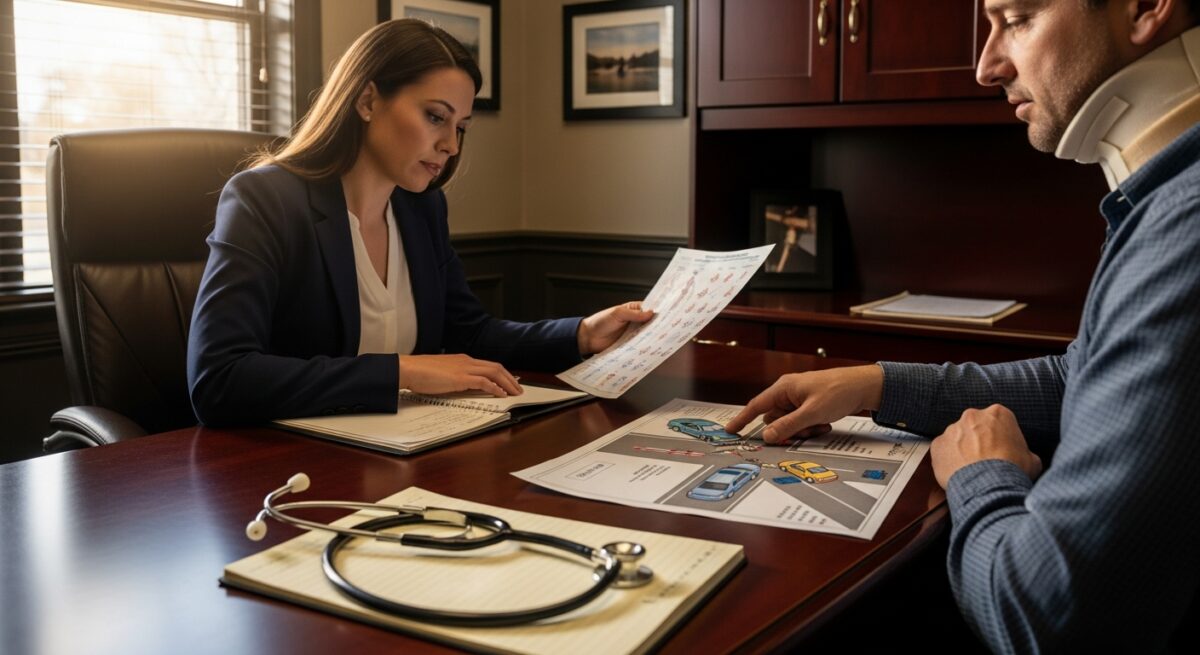How Does Personal Injury Work Understanding the Process and Your Rights

Understanding personal injury law is crucial for anyone involved in an accident or harmed by someone else’s negligence. So, how does personal injury work? It centers on individuals’ legal rights to seek compensation for damages incurred, aiding victims in recovering financially and emotionally.
Understanding Personal Injury Law
What is Personal Injury Law?
This branch of civil law addresses cases where individuals suffer harm due to wrongful conduct, including:
- Car accidents
- Slip and fall accidents
- Medical malpractice
- Workplace injuries
- Defamation Each category has unique legal nuances and requirements for proving negligence.
How Does Personal Injury Work?
The process typically involves:
- Consultation with an Attorney: Speak with a personal injury lawyer to assess your case.
- Investigation: Your attorney gathers evidence to build a strong case.
- Filing a Claim: If negotiations fail, a lawsuit may be filed.
- Settlement or Trial: Many cases settle, but some may go to trial if no agreement is reached.
Key Elements of a Personal Injury Case
To succeed, the following must be established:
- Duty of Care: The defendant’s legal obligation to the plaintiff.
- Breach of Duty: The defendant’s failure to meet that obligation.
- Causation: A direct link between the breach and the injury.
- Damages: Proof of actual damages, like medical expenses or lost wages.
Types of Personal Injury Cases
Understanding how does personal injury work involves recognizing the various types of cases under this law, which aims to compensate individuals harmed by another’s negligence. Knowing these types can help you determine if you have a valid claim.
Common Types of Personal Injury Cases
1. Car Accidents
- Car accidents are prevalent, with about 4.4 million injuries in the U.S. annually. Claims often target the at-fault driver’s insurance for medical expenses and lost wages.
2. Slip and Fall Accidents
- These occur due to unsafe conditions on someone else’s property, leading to over 8 million emergency room visits yearly. Property owners must maintain safety to avoid liability.
3. Medical Malpractice
- Arising from healthcare professionals failing to meet care standards, these complex cases can involve expert testimony. Approximately 225,000 deaths occur annually due to medical errors.
4. Workplace Injuries
- With 2.7 million nonfatal injuries reported in 2020, these cases often involve workers’ compensation claims for medical expenses.
5. Product Liability
- These cases involve injuries from defective products, with manufacturers liable for unsafe items. Millions of products are recalled each year for safety issues.
Understanding these types is essential for seeking compensation, and consulting an attorney can help navigate the complexities of personal injury law.
The Process of Filing a Personal Injury Claim
Understanding the process of personal injury claims is crucial for seeking compensation for injuries caused by someone else’s negligence. This process not only aids victims in recovering financially but also holds responsible parties accountable. Here’s a simplified overview of the steps involved in filing a personal injury claim:
1. Seek Medical Attention
- Immediate Care: Prioritize your health by seeking medical attention right after an accident.
- Documentation: Keep records of all medical visits and expenses, as this evidence is vital for your claim.
2. Gather Evidence
- Accident Reports: Obtain police reports related to the incident.
- Witness Statements: Collect contact information from witnesses.
- Photographic Evidence: Take photos of the scene and injuries.
3. Consult with a Personal Injury Attorney
- Expert Guidance: An attorney can clarify your rights and the claim’s value, often working on a contingency fee basis.
4. File Your Claim
- Insurance Notification: Notify the at-fault party’s insurance company and submit necessary documentation promptly.
5. Negotiate a Settlement
- Initial Offer: Expect a low initial offer and be prepared to negotiate for a fair amount.
6. Go to Trial (if necessary)
- Court Proceedings: If negotiations fail, your case may go to trial, where your attorney will represent you.
Determining Liability in Personal Injury Cases
Understanding how does personal injury work is essential for anyone involved in personal injury cases, which aim to compensate individuals harmed by another’s negligence. A key aspect of these cases is determining liability, which identifies who is responsible for the injury and who should pay for damages.
Determining liability revolves around proving negligence, which occurs when a party fails to act with reasonable care. To establish negligence, the following elements must be proven:
1. Duty of Care
- The defendant had a legal obligation to act safely towards the plaintiff.
2. Breach of Duty
- The defendant failed to meet the expected standard of care, such as speeding or distracted driving.
3. Causation
- A direct link must exist between the breach and the injury suffered.
4. Damages
- The plaintiff must have suffered actual damages, which can be physical, emotional, or financial.
Gathering evidence, such as witness statements, medical records, and police reports, is crucial to support negligence claims. Ultimately, understanding liability helps victims seek the justice they deserve.
Calculating Damages in Personal Injury Claims
Understanding how damages are calculated in personal injury claims is essential for determining the compensation you may receive. This process reflects the severity of your injuries and their impact on your life, empowering you to navigate your claim effectively.
Understanding Damages in Personal Injury Claims
Calculating damages involves assessing both economic and non-economic losses.
Economic Damages
These are tangible financial losses, including:
- Medical Expenses: Costs for hospital stays and treatment.
- Lost Wages: Income lost during recovery.
- Property Damage: Repair or replacement costs for damaged property.
For example, a hospital stay in the U.S. can exceed $10,000.
Non-Economic Damages
These are subjective and include:
- Pain and Suffering: Compensation for physical pain and emotional distress.
- Loss of Enjoyment of Life: Damages for the inability to engage in enjoyable activities.
- Emotional Distress: Compensation for mental health issues stemming from the injury.
The Role of Insurance Companies
Insurance companies assess claims, often leading to disputes over compensation. Key points include:
- Adjusters’ Evaluations: May undervalue your damages.
- Negotiation: Initial offers are often lower than deserved.
- Documentation: Essential for supporting your claim.
In summary, understanding how does personal injury work can significantly influence your claim’s outcome and ensure fair compensation.
The Role of Insurance in Personal Injury
Understanding the role of insurance in personal injury claims is crucial. Many people ask, how does personal injury work? It involves not only the injuries but also how insurance companies evaluate and compensate for them. Insurance significantly influences the outcome of personal injury cases, from the initial claim to the final settlement.
The Importance of Insurance in Personal Injury Claims
Insurance serves as the backbone of personal injury claims for several reasons:
- Financial Protection: It covers medical expenses, lost wages, and other damages from accidents.
- Legal Representation: Many policies offer legal support, aiding in navigating personal injury law.
- Negotiation Power: Insurance companies are skilled negotiators, often leading to better settlements.
Types of Insurance Involved in Personal Injury
Key types of insurance include:
- Auto Insurance: Covers injuries from car accidents.
- Homeowners Insurance: Addresses injuries on your property.
- Health Insurance: May cover medical expenses but often requires reimbursement from settlements.
The Claims Process and Insurance
The claims process involves filing a claim, investigation, negotiation, and final settlement. Statistics show that over 38,000 fatalities occurred in 2020 due to vehicle crashes, emphasizing the importance of auto insurance. Additionally, about 70% of personal injury claims settle before trial, often due to effective negotiations. Understanding insurance can empower you in your personal injury journey.
Common Myths About Personal Injury Claims
Many people have misconceptions about personal injury claims, which can lead to confusion. Understanding how personal injury works is essential for anyone considering filing a claim. Personal injury law aims to assist individuals harmed by someone else’s negligence. However, myths can hinder access to justice and fair compensation.
Myth 1: Personal Injury Claims Are Always a Quick Process
- Many believe they will receive compensation quickly after filing a claim. In reality, these claims can take months or years to resolve, often averaging 12 to 18 months, depending on complexity.
Myth 2: You Can Only Claim for Physical Injuries
- Some think claims are limited to physical injuries, but emotional distress and psychological trauma can also be grounds for a claim, significantly affecting a victim’s life.
Myth 3: You Don’t Need a Lawyer for a Personal Injury Claim
- While handling a claim alone is possible, hiring an experienced attorney can increase the chances of fair compensation, with statistics showing settlements can be three times higher.
You could be entitled to compensation. Find out free at LegalCaseReview.com or dial 📞 (833) 279-1850.



